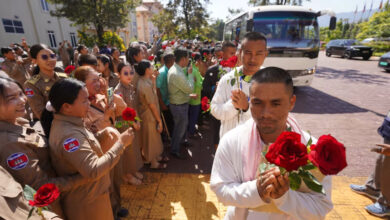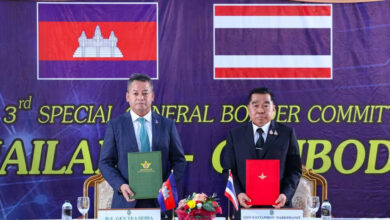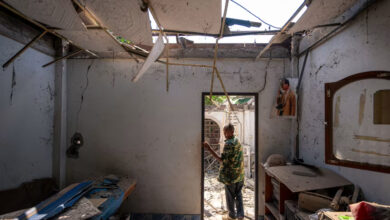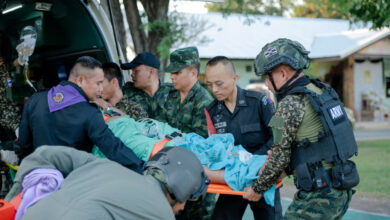Bangkok–Almost the entire core leadership of the Thai protesters who built barricades and battled with soldiers in central Bangkok was in custody following the surrender Monday of two top organizers, official media said.
Only one major figure of the Red Shirt protesters–a former pop singer who was among the most radical of the activists–remains at large while eight are being held by authorities. Arisman Pongruangrong is believed to have fled the Thai capital into the countryside.
Suthachai Yimprasert and Samyot Pruksakasaemsuk surrendered to police Monday morning, the government’s Thai News Agency said, as Bangkok residents returned to work after a week of government-ordered holidays during which the military cleared Bangkok’s main commercial district that had been occupied by the Red Shirts.
Prime Minister Abhisit Vejjajiva on Sunday extended a nighttime curfew in the capital and said he will consider early elections only after the violence that has wracked the nation for the past two months is completely over.
Elections are seen as a key step toward healing the deep divide that has split Thailand between supporters of Abhisit and the Red Shirts, who are made up mainly of the urban and rural poor and see Abhisit’s government as elitist and illegitimate.
The rift with the Red Shirts, who have strong support in the country’s north and northeast, came to a crescendo of violence after they occupied the heart of Bangkok, sparking a military crackdown that ended in a rampage of grenade attacks and arson at dozens of buildings, including the country’s stock exchange and biggest shopping mall.
In all, 85 people were killed in the violence–the worst the Thai capital has seen in decades.
Abhisit said in a weekly address that while he is still willing to call elections before his term expires late next year, he will not do so under the threat of violence.
He accused Red Shirt followers of planning further mayhem, although he stressed that the government was in control and that the capital has largely returned to normal after a final push by the military to clear the main protest site last Wednesday left 16 dead and more than 100 injured.
Hoping to appease the protesters, Abhisit earlier this month offered to hold elections on 14 November. But the reconciliation plan fell through when Red Shirt leaders, who want him to resign immediately, made more demands.
Many analysts believe the Red Shirts, who support ousted Prime Minister Thaksin Shinawatra, could cause unrest for years to come. Thaksin lives in exile after his 2006 ouster in a military coup and subsequent conviction on corruption-related charges, but he continues to influenceThai politics.
Abhisit’s government took power in December 2008, not through an election but by a vote in Parliament, to fill the power vacuum after disputed court rulings ousted two elected pro-Thaksin governments.
Despite the political upheaval, there were increasing signs that residents of Bangkok were trying to get back to normal routines.
Thousands of residents mobilized in cleanup squads to clear the streets of mountains of garbage and rubble left by the protests and violence.
The city’s two main mass transit systems, the Skytrain and the subway, reopened Sunday after a week’s closure. But TAN Network, Thailand’s English language television, reported that cleaning operations were stopped after troops found 20 homemade bombs near a station.
Government spokesman Panitan Wattanayagorn said “generally it has been quiet” in the country, but added that there are “a few reports of people gathering” and sporadic incidents of violence.
World




